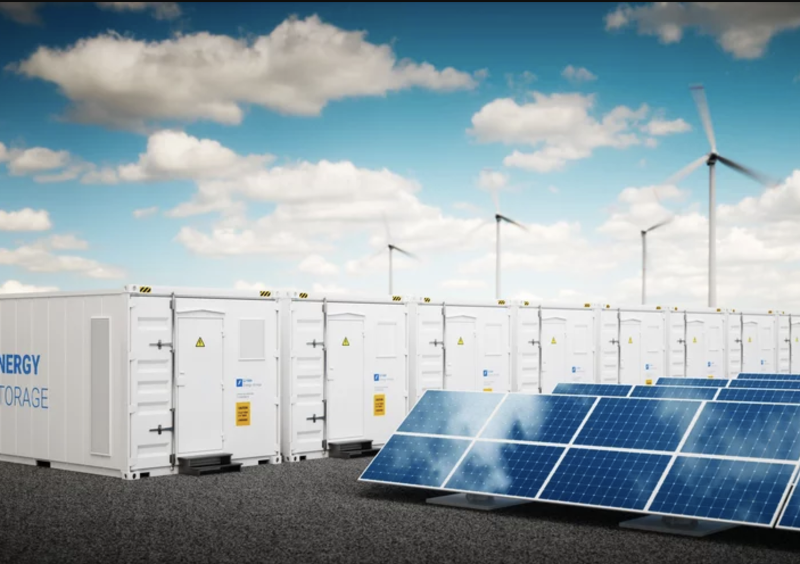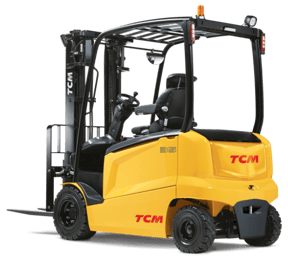Lithium-ion.
At TCM, we're committed to helping you find the most efficient and cost-effective battery choice for your applications.
Most efficient & cost-effective battery choice.
Contents
- Lithium-Ion Batteries
- Helping you find the right solution
- Why choose lithium-ion?
- Forklift safety and efficiency
- Lithium-ion battery charging
- Lead acid vs. lithium-ion: which best suits my business?
- Lead acid vs. lithium-ion cost
- Lithium-ion compatible products
- Assessing your operation: TCO Calculator
With electrification at the forefront of operations managers’ minds, discussions surrounding lithium-ion battery technology continue to colour the material handling industry.
At TCM, we’re committed to helping you find the most efficient and cost-effective battery choice for your operations.
Read on to learn more about lithium-ion (Li-ion), why you might choose to
Lithium-Ion Batteries
What is a lithium-ion battery?
Lithium-ion batteries are a type of rechargeable battery. They have a high energy density (meaning that they can store lots of energy), no memory effect (they don’t need to be fully discharged before charging), and a low self-discharge.
Li-ion batteries are growing in popularity for battery-powered electric vehicles, as they’re more energy-efficient than other battery alternatives available, and they don’t produce harmful emissions.
How do lithium-ion batteries work?
Lithium-ion batteries come in many different chemistries and cell types, with each having its own unique properties, depending on requirements for the individual battery. Since lithium is a highly reactive element, it can store lots of energy in its atomic bonds — that’s why Li-ion batteries are described as having a ‘high energy density’.
TCM uses Lithium Nickel Manganese Cobalt Oxide (NMC) chemistry, since it offers optimum performance, lifetime and safety levels for forklift trucks, as well as in the EV industry.
To see if Lithium suits your business, we need to understand your application better, so discover which battery technology best suits your operation by getting in touch with one of your local dealers.
Helping you find the right solution

With a broad range of batteries on the market and conflicting information on each, it can be difficult knowing which battery type is best suited to your business. That’s why at TCM, we help you to analyse your operation and better understand your requirements.
The more you use your forklift fleet, the quicker the return on your investment when it comes to lithium-ion batteries — especially for multi-shift operations.
However, that’s not the only reason to consider Li-ion battery technology; Li-ion batteries are also more energy-efficient than traditional forklift batteries, making them a more cost-effective alternative for businesses looking to save in the long run.
Why choose lithium-ion?
Benefits
Li-ion batteries boast numerous benefits for businesses that choose to adopt them, including:
- They use 30% less energy, contributing towards a lower TCO (total cost of operation)
- They’re quick to charge and can also be opportunity-charged, improving efficiency
- Lithium-ion has a longer battery life than other battery alternatives (such as lead-acid)
- You don’t need to change batteries mid-shift, increasing productivity
- They don’t require maintenance or gassing
- They don’t produce harmful emissions
Lithium-ion battery cost
Li-ion batteries have a higher acquisition cost than alternatives such as lead-acid. However, as Li-ion batteries are more energy-efficient, your business can, in fact, make considerable savings in the long run.
Forklift safety and efficiency
At TCM, we prioritise safety and efficiency in equal measure. That’s why our Li-ion batteries have been designed to provide higher and sustained voltage levels, resulting in improved performance compared to alternative battery technologies such as lead-acid.
TCM Li-ion batteries have been specifically engineered for use with TCM forklift trucks to ensure safe operation, meaning the truck can even shut itself down automatically if needed.
Lithium-ion battery charging

Charging your TCM Li-ion batteries couldn’t be easier
Simply connect the charger and the truck will automatically shut down ready for charging.
Due to their fast charging capability, your battery can be fully charged in as little as one hour.
Position your chargers where they will be the most accessible during shift breaks. That way, charging your forklift batteries will quickly become a daily habit and you’ll never have to waste unnecessary downtime again.
What about lithium-ion battery life?
It’s worth noting that lithium-ion technology has a much longer battery life than other battery alternatives — usually by about three times — including lead-acid. There is also no risk of damaging the battery due to poor maintenance, which is not unusual for lead-acid batteries.
Discover which battery technology best suits your operation. Click here to speak to your local dealer today.
Lead acid vs. lithium-ion: which best suits my business?
Lead-acid:
As the most economical commercially available option, lead-acid is likely to remain a popular choice in one shift or low intensity operations, especially due to the associated maintenance and battery life.
In multi-shift operations, provided the battery change systems provide a quick and safe way to change batteries, lead-acid is likely to be the best investment for years to come. Another important aspect in busy multi-shift operations is that lead-acid powered trucks with easy battery change capability will always be accessible.
Lead-acid (also known as wet-cell) batteries are less expensive than Li-ion, and they are easily recyclable. Depending on your application, operation intensity, and ability to perform maintenance to achieve an acceptable battery lifetime, lead-acid technology provides a good alternative to lithium-ion.
Lithium-ion:
For businesses interested in future-proofing their operations, it’s worth familiarising yourself with the benefits of Li-ion batteries now.
Due to the higher investment cost per kWh, the capacity of a Li-ion battery is usually about 55-70% of a lead-acid battery for the same application. This is made possible by its fast charging ability. Charging in 1C (fully charged in one hour, or 25% in 15 minutes) makes it ideal for opportunity charging.
Unlike lead-acid, where the chemistry and technology only offers about 1,500 charging cycles before its battery life ends, Li-ion batteries aren’t negatively impacted by the number of charging occasions. In fact, opportunity-charged Li-ion batteries in 24/7 operations minimise downtime when charged during breaks, maximising productivity.
Since Li-ion batteries recharge much faster than the alternative commercial options available, you will only ever need one battery per forklift (in comparison to two lead-acid batteries in multi-shift operations).
Lead acid vs. lithium-ion cost
Despite the higher acquisition cost, Li-ion batteries quickly pay for themselves in significantly reduced running and labour costs, as they consume much less energy and require no maintenance.
At TCM, we recommend a full and comprehensive study of your operation to determine which product best suits your business operationally and commercially.
Another aspect that is crucial to consider is available grid power supply. Opportunity charging usually requires about three times more grid power than traditional 7-8 hour lead-acid battery charging. This could impact your power supply costs.
Find out more about the differences between lead-acid vs. lithium-ion.
Lithium-ion compatible products

At TCM, we are continuing to develop our Li-ion battery technology. This means that an increasing number of products will become available for use with Li-ion batteries in future.
TCM products that are currently compatible with lithium-ion batteries include our rider pallet trucks, powered pallet trucks, and stackers.
We continue to develop further products, which will be available later this year. This will include our walkie low-lifter and stacker range, in addition to new and improved reach and counterbalance trucks.
To learn more, check out our guide on investing in electric forklifts.
Assessing your operation: Guide To Reducing Your TCO
Li-ion batteries boast numerous benefits for businesses that choose to adopt them, but at TCM, we understand that it can be difficult to visualise the long-term ROI of your initial investment.
Our "Guide To Reducing Your TCO" has been specifically written to show you how switching to Li-ion batteries will impact your TCO — so that you can feel confident in making the switch.
Download it by clicking here.

Calculating TCO
For a more accurate idea of how much you could save over the course of your business’ electrification journey.
Related Content.
Get in touch.
We have proven solutions for every industry.


